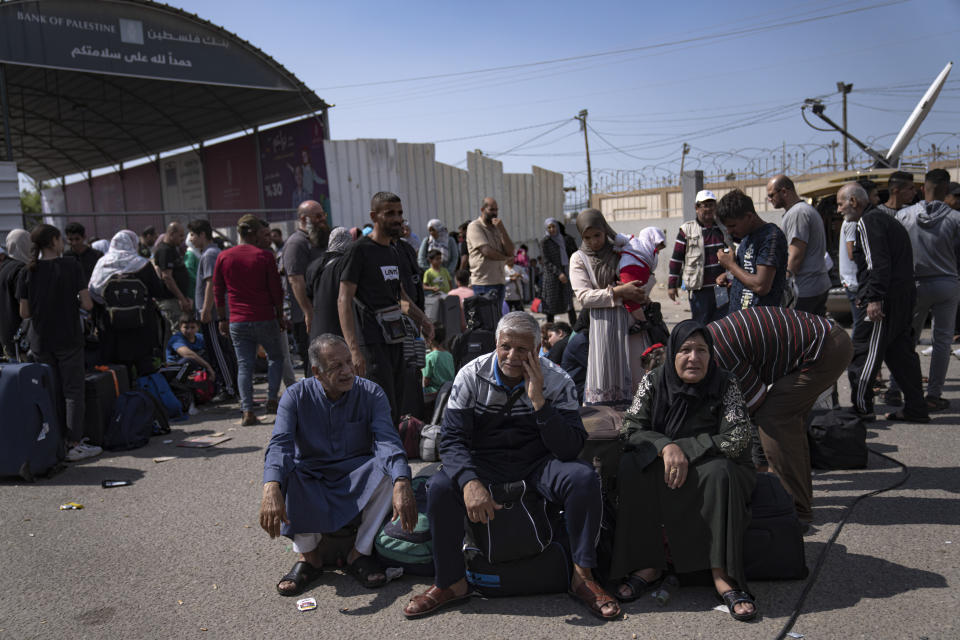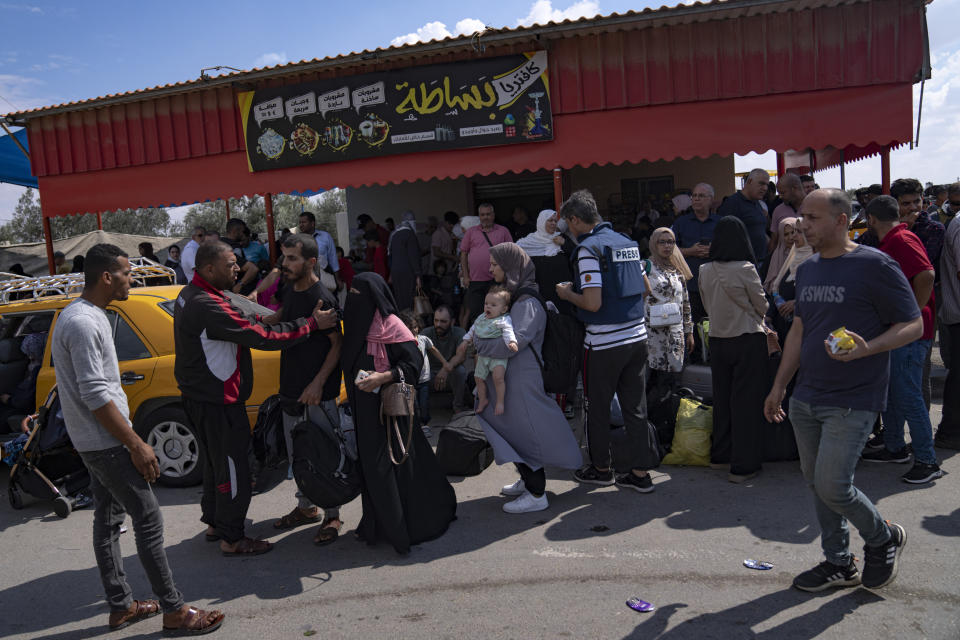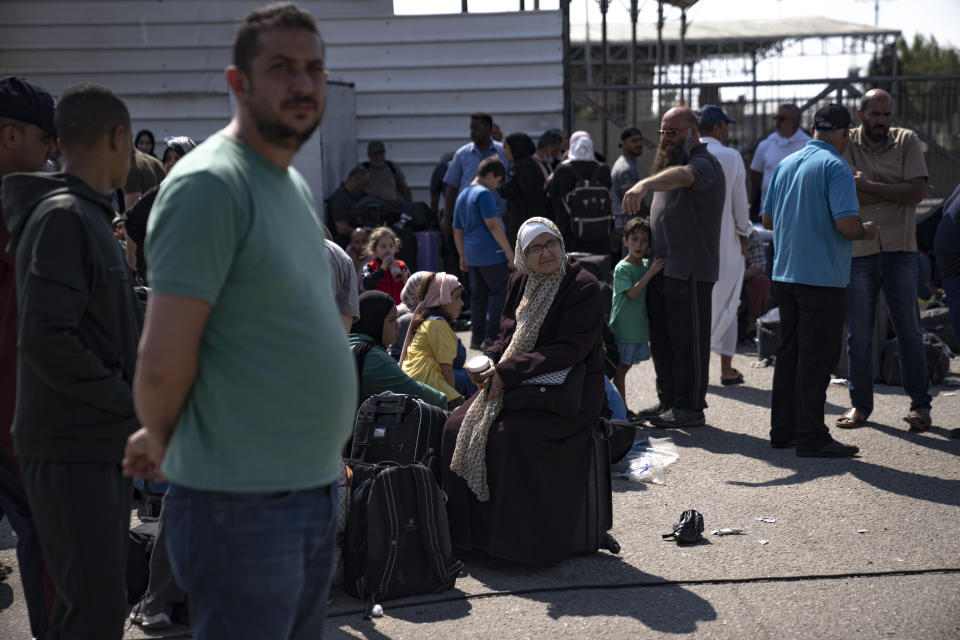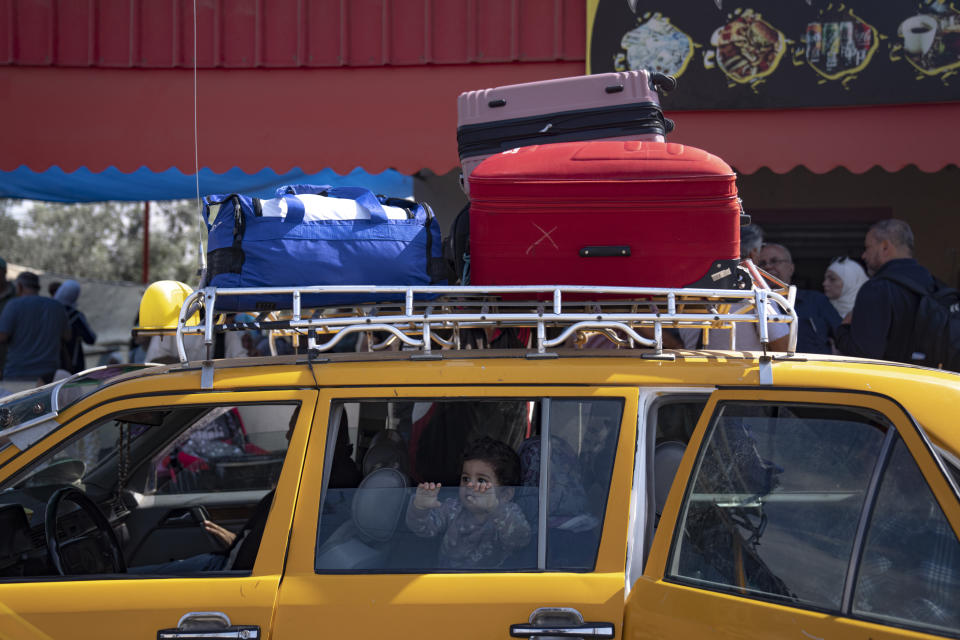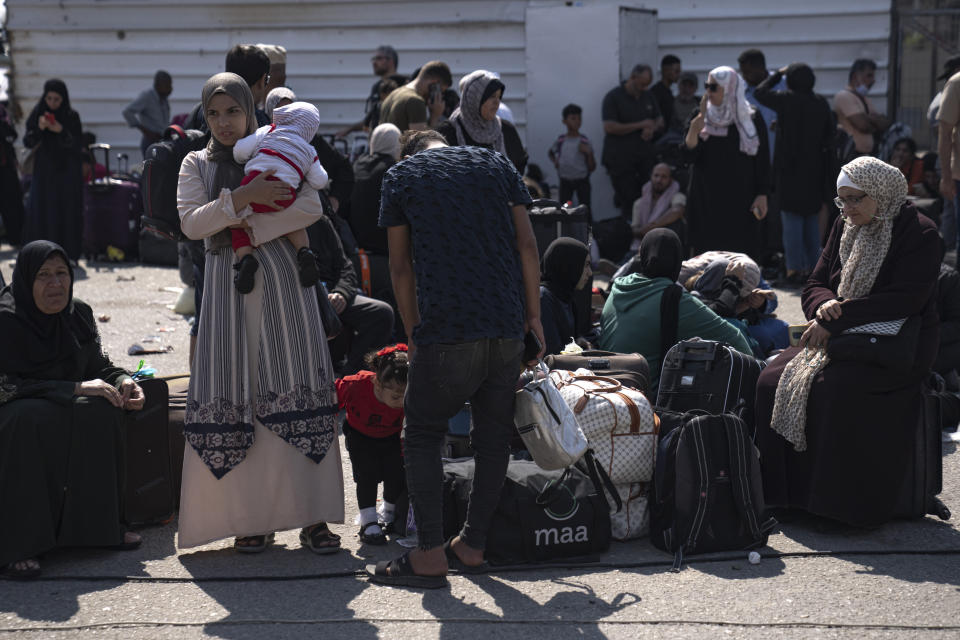Stranded at a closed border as bombs fall, foreign nationals in besieged Gaza await evacuation
KHAN YOUNIS, Gaza Strip (AP) — For more than a week, Talaat Ghabayen, a citizen of Norway who spent his whole life in Oslo, has waited days and nights at the Gaza Strip's land crossing with Egypt as his embassy advised, hoping to flee Israel's bombardment and looming ground invasion and reunite with his wife and sons back home.
“Egypt is literally meters away, I can see it,” Ghabayen, a 54-year-old insurance agent who traveled to Gaza before the war erupted for his mother's funeral, said Tuesday from the Rafah crossing.
Under intense Western pressure, the gates at Rafah opened over the weekend for the first time since the war broke out, letting a trickle of humanitarian aid into the besieged strip and stoking hopes that hundreds of foreign nationals trapped in Gaza would be able to cross into safety.
But with each passing hour, Ghabayen loses hope. And each day that Rafah remains shut, he said, is another day that he could die.
“They tell us to go south, then they bomb south. They tell us to go to hospitals, then they bomb hospitals. They tell us to go to shelters, then they bomb shelters,” Ghabayen said of the Israeli army, his voice rising with emotion. “We are not Hamas, we are innocent civilians who don’t even live here.”
The Israeli military says it goes after only Hamas infrastructure in their war with the militant group. Palestinians reject that, pointing to airstrikes that have hit and damaged U.N. schools and hospitals in the densely populated strip.
Since the war broke out, the United States and other countries have scrambled to arrange charter flights — and even an evacuation ship — to ferry their citizens in Israel to various destinations in Europe.
But no such evacuation has materialized for foreign citizens stranded in Gaza, who are coping with the fiercest Israeli bombing campaign in the territory's memory and dire shortages of food, water and fuel since Israel severed its flow of supplies to the strip.
Ghabayen is among what Western diplomats estimate to be some 1,700 Palestinians in Gaza with European or U.S. citizenship, caught up in Israel's devastating air campaign that has killed thousands of Palestinians and crushed entire neighborhoods. Israel launched its counteroffensive after Hamas fighters surged into Israel on Oct. 7, killing 1,400 people and abducting over 200 others in an unprecedented attack.
On top of that, there are hundreds of Palestinians in Gaza holding other foreign passports. Many said their governments told them to fill out forms and wait at the Rafah crossing.
More than a week later, they're still waiting. In some cases, the bombs got to them first.
“We waited so long they'll have to evacuate us by ambulance,” said Abdelaziz Shaaban, who said American authorities assured him that his whole family would be able to leave through Rafah because his son is a U.S. citizen.
An airstrike crashed outside his home in Gaza City last week, killing his 14-year-old daughter, Joud, and wounding everyone else in the house — just as they were preparing to try their luck at Rafah a third time. His 18-year-old son Youssef, born in Kalamazoo, Michigan, has a broken jaw and wrist. His other daughter broke her arm. Shaaban lost so much blood that he struggles to walk.
“‘We are studying the case, we are studying the case,’ they tell us over and over,” Shaaban said of U.S. officials. “What are you studying? We are wounded and can’t get painkillers. We are wounded and Shifa Hospital kicked us out because they needed room for more patients.”
Shifa Hospital, Gaza's biggest, is struggling to handle a deluge of war-wounded patients as its resources dwindle. While some trucks of humanitarian aid gradually made their way into Gaza in recent days from Egypt, Palestinians say it's nowhere near enough to address the humanitarian disaster.
Egypt has refused to open its doors to those fleeing Gaza — in part because it doesn't want to be seen as aiding Israel's forced displacement of Palestinians but also because it doesn't want a massive refugee crisis within its borders.
As the days tick by, the desperation of foreign nationals trapped in Gaza is growing. Many are increasingly upset with what seems to them a double standard in Western policy. The same countries failing to respond to their plight, they say, have galvanized to evacuate their citizens from Israel and other war-zones around the world.
“It really makes us feel like second-class citizens,” said Mahmoud Sarhan, a 48-year-old security guard from Essen, Germany, who made his first trip to Gaza in nearly three decades before the war to tend to his ailing mother in the northern Jabaliya refugee camp.
Sarhan said he is sleeping on the street in Rafah in case the crossing opens without warning. Others are staying with friends and relatives near the crossing or making the treacherous trip several times a week.
After an Israeli airstrike tore into his Sarhan's family house in the north, killing his sister, an English teacher, and her eight children, he said he had nowhere else to go. His mother came with him to Rafah and it's not clear if she'll be able to travel with him to Germany.
“They help their own in Ukraine, in every part of the world where their citizens are in danger. But not Gaza,” he said of Western governments.
For Palestinian Americans stuck in Gaza, President Joe Biden’s proclamations of staunch support for Israel during his wartime visit to the country following Hamas' unprecedented attack has added to resentments.
“Ridiculous," was how Hamdan Abu Speitan, a 76-year-old physician from Syracuse, New York, put it.
“He is so busy trying to give Israel weapons that he can't get water in or get Americans out,” he said, referring to Biden.
The State Department said David Satterfield, recently appointed special envoy for humanitarian issues in the Mideast, was in Israel Tuesday engaged in negotiations with Israel, Egypt and the United Nations to get Rafah to open for U.S. citizens, other dual nationals and employees of international organizations.
Matthew Miller, the State Department spokesman, blamed Hamas for the hold-up in a briefing on Monday.
“We do believe that Egypt is ready to process American citizens if they can make it to Egyptian authorities,” he told reporters. “Hamas just has to stop blocking their exit.”
After days of subsisting on tea, bread and onions, Abu Speitan said he was feeling dehydrated and exhausted. His sister’s house in Deir al-Balah, central Gaza had no generator — just a solar phone charger so he could keep in touch with his worried family back in New York and Boston.
Over the weekend an airstrike slammed into a house just 500 meters (yards) away, sending shrapnel into his room. He clutched his face — blood was gushing everywhere.
He left the hospital and headed straight to Rafah crossing on Tuesday for the fourth time in the past week. There was no indication this time would be any different. But he said he had no other choice.
“We are stuck waiting, without any information,” he said at the border crowded with Palestinians from America, Canada, Germany, Sweden and countless other countries, some of them wounded. “Let me know if you hear something.”
___
DeBre reported from Jerusalem

